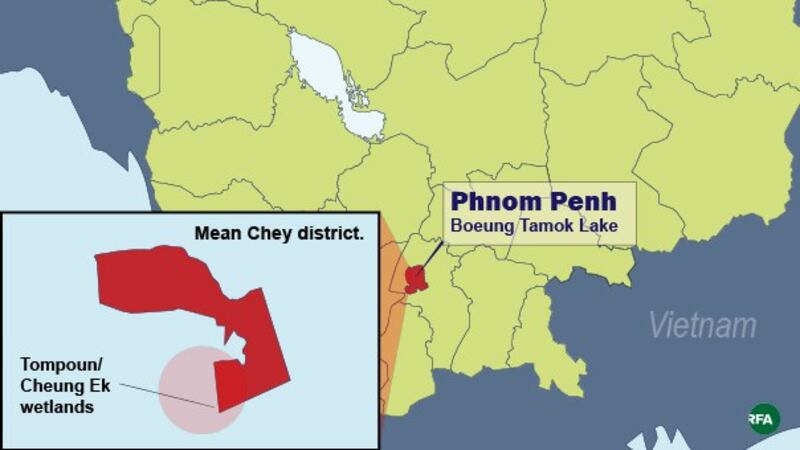Development on one of the last large lakes in Cambodia’s capital Phnom Penh is impacting communities that rely on it for their livelihoods and causing significant flooding in the city as the result of runoff during heavy rains, an environmental watchdog said Thursday, calling for an end to the practice.
In a video posted to Facebook, Mother Nature said that despite a 2016 decree signed by Prime Minister Hun Sen recognizing the 3,240-hectare (8,000-acre) Boeung Tamok Lake as public land, the government in June authorized the Ministry of National Defense to fill in around 300 hectares (740 acres) of it to build a military base. The allocation was only made public earlier this month.
Last month’s granting of permission to reclaim land from the lake marks the eighth time the government has done so, after earlier allowing the filling in of 535 hectares (1,320 acres) for official use and private development, Mother Nature noted.
Development has proceeded despite a law which says public land—including lakes—cannot be sold or leased unless they have lost their “public interest value.”
Hun Sen has defended earlier allocations as part of a battle against mosquito breeding grounds.
Mother Nature cited a recent report by Sahmakum Teang Tnaut (STT) which listed the public benefits of the lake as providing an important reservoir and habitat for bird species. The group also noted that more than 300 families depend on it to earn a daily income through fishing and growing lotus.
Additionally, the video said, the filling up of Boeung Tamok Lake and other lakes in the capital for development is eliminating crucial reservoirs for rainfall, causing severe flooding in the city during weather events.
Activists from the group urged Hun Sen to call an immediate halt to development of the lake and asked for community support to ensure that he acts.

More harm than benefits
Speaking to RFA’s Khmer Service on Thursday, Mother Nature activist Thun Ratha said that fishermen and villagers who rely on the lake routinely complain about the situation.
“They said they are facing a similar fate as the people from Boeung Kak, because those villagers did not get any compensation,” he said, referring to the forced eviction of some 3,500 families from another lake community in Phnom Penh to make way for a development project with close ties to Hun Sen and his ruling Cambodian People’s Party (CPP).
“I wonder why development has to do with filling lakes and evicting people?”
Thun Ratha warned that the city will be increasingly flooded during storms because there are fewer places to absorb rainwater amid the lake development.
“Filling in the lake not only affects the people who rely on it or those who live close by, but also people in Phnom Penh,” he said.
“I have observed that each time there is rain, people’s houses are flooded, and their property is destroyed.”
Furthermore, sand being used to reclaim the lake is being dredged from the Mekong River, which is causing erosion and the destruction of homes along the banks of the waterway.
Another activist named Long Kunthea told RFA that filling in lakes has caused the country more harm than benefits. She said there are around 20 lakes in Phnom Penh, some of which are already completely filled in.
“Boeung Tamok is a beautiful lake because of its lotuses—it should have been preserved as a tourist destination site or to let the people use the lake,” she said.
“Filling in lakes for development won’t benefit villagers, it will have negative impacts for them. So, we are asking the government to reconsider and stop filling Boeung Tamok.”
Wetlands at risk
The Mother Nature video comes amid the release this month of a report detailing the social and human rights impact of development of the 1,500-hectare (3,700-acre) Tompoun/Cheung Ek wetlands in southern Phnom Penh’s Mean Chey district.
“Smoke on the Water,” compiled by local rights groups LICADHO, STT, the Cambodian Youth Network (CYN), and Equitable Cambodia (EC), called the wetlands a vital flood protection area for Phnom Penh and the city’s only wastewater treatment system, as well as crucial to the livelihoods of families who use the area for farming and fishing.
But recent land cuts indicate that more than 90 percent of the wetlands area is slated to be filled in to make way for the ING City real estate project, the report said, noting that satellite imagery suggests roughly one-third has already been reclaimed with sand.
“Since 2004, the ING City project has been progressively destroying the Tompoun/Cheung Ek wetlands in Phnom Penh, threatening the livelihoods and homes of more than a thousand families, devastating the wetlands ecosystem, placing more than a million people at increased risk of flooding, worsening food insecurity, and polluting the Mekong and Bassac rivers with untreated sewage and harmful pollutants,” it said.
In their conclusion, the groups recommended that the government cease further developments in the wetlands area until all environmental and human rights impacts are studied and clearly understood. They also called on the government to ensure that evictions and land disputes are dealt with in accordance with the law and to consider alternative options to ING City and other related developments.
Reported by RFA’s Khmer Service. Translated by Samean Yun. Written in English by Joshua Lipes.

